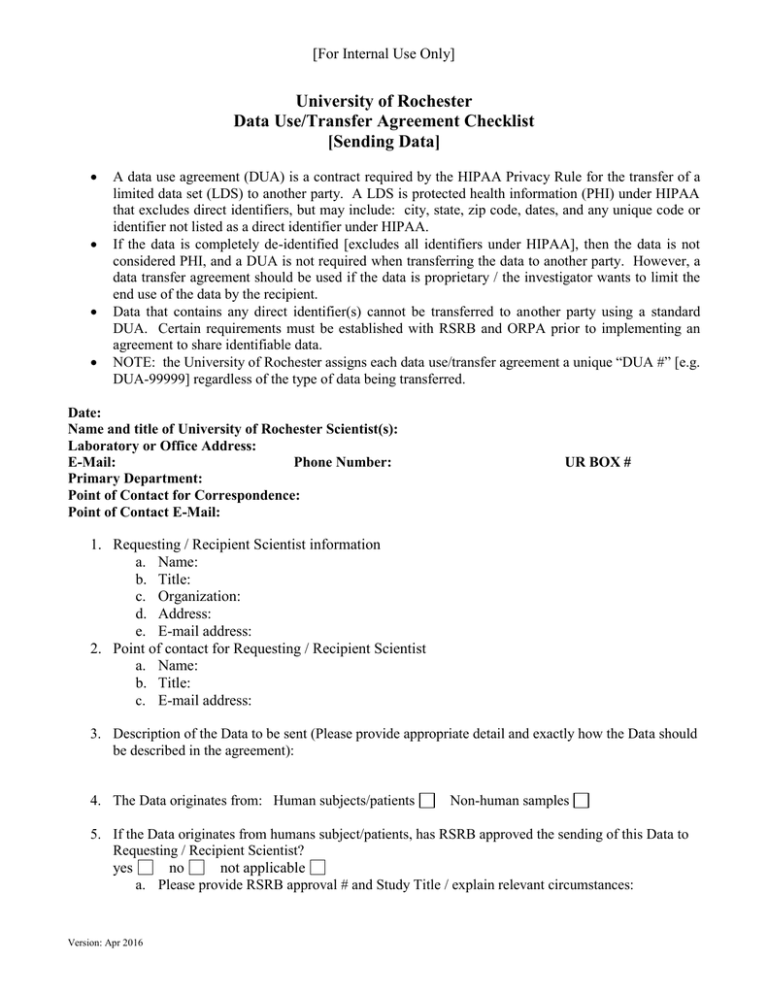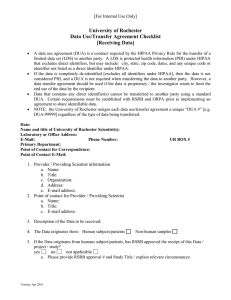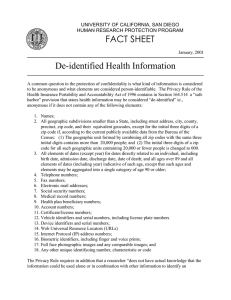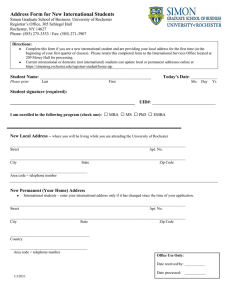Sending Data - DUA
advertisement

[For Internal Use Only] University of Rochester Data Use/Transfer Agreement Checklist [Sending Data] A data use agreement (DUA) is a contract required by the HIPAA Privacy Rule for the transfer of a limited data set (LDS) to another party. A LDS is protected health information (PHI) under HIPAA that excludes direct identifiers, but may include: city, state, zip code, dates, and any unique code or identifier not listed as a direct identifier under HIPAA. If the data is completely de-identified [excludes all identifiers under HIPAA], then the data is not considered PHI, and a DUA is not required when transferring the data to another party. However, a data transfer agreement should be used if the data is proprietary / the investigator wants to limit the end use of the data by the recipient. Data that contains any direct identifier(s) cannot be transferred to another party using a standard DUA. Certain requirements must be established with RSRB and ORPA prior to implementing an agreement to share identifiable data. NOTE: the University of Rochester assigns each data use/transfer agreement a unique “DUA #” [e.g. DUA-99999] regardless of the type of data being transferred. Date: Name and title of University of Rochester Scientist(s): Laboratory or Office Address: E-Mail: Phone Number: Primary Department: Point of Contact for Correspondence: Point of Contact E-Mail: UR BOX # 1. Requesting / Recipient Scientist information a. Name: b. Title: c. Organization: d. Address: e. E-mail address: 2. Point of contact for Requesting / Recipient Scientist a. Name: b. Title: c. E-mail address: 3. Description of the Data to be sent (Please provide appropriate detail and exactly how the Data should be described in the agreement): 4. The Data originates from: Human subjects/patients Non-human samples 5. If the Data originates from humans subject/patients, has RSRB approved the sending of this Data to Requesting / Recipient Scientist? yes no not applicable a. Please provide RSRB approval # and Study Title / explain relevant circumstances: Version: Apr 2016 [For Internal Use Only] 6. If the Data originates from human subjects/patients, the Data is (check only one: a, b or c): a. de-identified i. If sending de-identified Data, please fill out and submit HIPAA Form 25.5.1 [Once submitted online, a PDF copy of the completed form is e-mailed to the “Contact Email address” please forward a PDF copy to the Material Transfer Agreement Administrator by e-mail] b. a limited data set (LDS) i. if sending a limited data set (LDS), please fill out and submit HIPAA Form 25.6.1 [Once submitted online, a PDF copy of the completed form is e-mailed to the “Contact Email address” please forward a PDF copy to the Material Transfer Agreement Administrator by e-mail] c. more than a limited data set (LDS) / contains direct identifier(s) i. if sending more than a limited data set (LDS), has specific patient consent / authorization been received? yes no 1. If yes, please provide a copy of the applicable consent / authorization form 2. If no, please provide further explanation: 7. Should the Requesting / Recipient Scientist be restricted to only use the Data for a specific research project / purpose? yes no a. If yes, please provide the specific research project title / purpose exactly how it should be described in the agreement: 8. Was the Data collected or developed at the University of Rochester by the Scientist? yes no a. If no, where did the Data originate from? b. If no, was there a previous agreement to cover the transfer of Data to the University of Rochester? yes no i. If yes, what is the previous University of Rochester DUA #? 9. Does the Data contain whole genome / exome sequencing data? yes no 10. Will material (e.g. cells, tissues, images) be sent in addition to the Data? yes no a. If Yes, please provide appropriate detail and exactly how the material should be described in an agreement with the Recipient university / organization: 11. Is the Data related to developing intellectual property, an invention disclosure or patent application? yes no a. If yes, have you contacted UR Ventures? yes no b. If yes, please summarize the intellectual property as it relates to this agreement: 12. Is all or part of the Data stored in the Center for Integrated Research and Computing (CIRC)? yes no Version: Apr 2016 [For Internal Use Only] 13. Is this Data related to a collaborative study involving multiple institutions? yes no a. If yes, we should consider referencing the study and collaborators in the agreement or implement a master DUA with the multiple institutions 14. Please identify the funding source for the research generating this Data [if applicable] a. U.S. Government Non-Profit Industry Internal/discretionary 15. Please indicate if the agreement should have an automatic termination date [e.g. after 1 year, 2 years, 3 years, etc.] [Note: while an automatic termination date is not required, it is preferred] 16. Will there be any fees associated with the transfer of the Data [e.g. cost reimbursement] yes no a. If yes, please specify exact $ amount: 17. Do you have any applicable / relevant financial relationship or financial interest of any kind with or in the proposed recipient(s) of the Data? yes no a. If yes, please provide further information 18. Please indicate any other relevant information / circumstances involving the transfer of this Data that may be helpful when drafting the agreement: Please submit the completed Checklist by e-mail to either Josef Mejido [josef.mejido@rochester.edu] or Jena Ashley [jena.ashley@rochester.edu] dependent on the department within University of Rochester this DUA pertains to [see link] Note that the appropriate University of Rochester address for all Data Use/Transfer Agreements is: University of Rochester Office of Research & Project Administration 518 Hylan Building, Box 270140 Rochester, NY 14627 Version: Apr 2016 [For Internal Use Only] Description of Limited Data Set and De-Identified Data Set De-Identified Data Set: The De-Identified Data Set must EXCLUDE all of the following direct identifiers of the individual or of the individual’s relatives, employers or household members to be considered De-Identified Data: a. Names; b. All geographic subdivisions smaller than a State, including: street address, city, county, precinct, zip codes and their equivalent geocodes, except for the initial three digits of a zip code if, according to the current publicly-available data from the Bureau of Census: (1) the geographic unit formed by combining all zip codes with the same three initial digits contains more than 20,000; and (2) the initial three digits of the zip code for all such geographic units containing 20,000 or fewer people is changed to 000. c. All elements of dates (except year) for dates directly related to an individual, including: birth date, admission date, discharge date, date of death; and all ages over 89 and all elements of dates (including year) indicative of such age, except that such ages and elements may be aggregated into a single category of age 90 or older; d. Telephone numbers; e. Fax numbers; f. E-mail addresses; g. Social Security numbers; h. Medical record numbers; i. Health plan beneficiary numbers; j. Account numbers; k. Certificate/license numbers; l. Vehicle identifiers and serial numbers, including license plate numbers; m. Device identifiers and serial numbers; n. Web Universal Resource Locators (URLs); o. Internet Protocol (IP) address numbers; p. Biometric identifiers, including finger and voice prints; q. Full face photographic images and any comparable images; and r. Any other unique identifying numbers, characteristics or code Limited Data Set (LDS): Researcher may use or disclose a LDS without an authorization from a research subject(s) if the following conditions are met: A LDS is defined as Protected Health Information that must exclude all of the above identifiers with exception of the following identifiers: 1) town, city, state and zip code; 2) all dates related to an individual, including birth date, admission date, discharge date and date of death; and 3) unique codes or identifiers not listed as direct identifier. Version: Apr 2016



